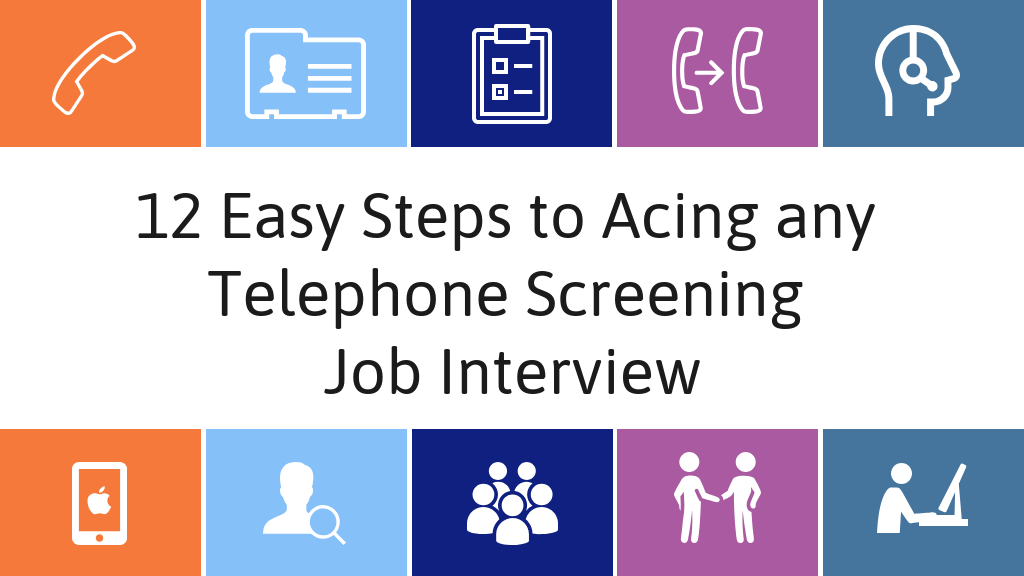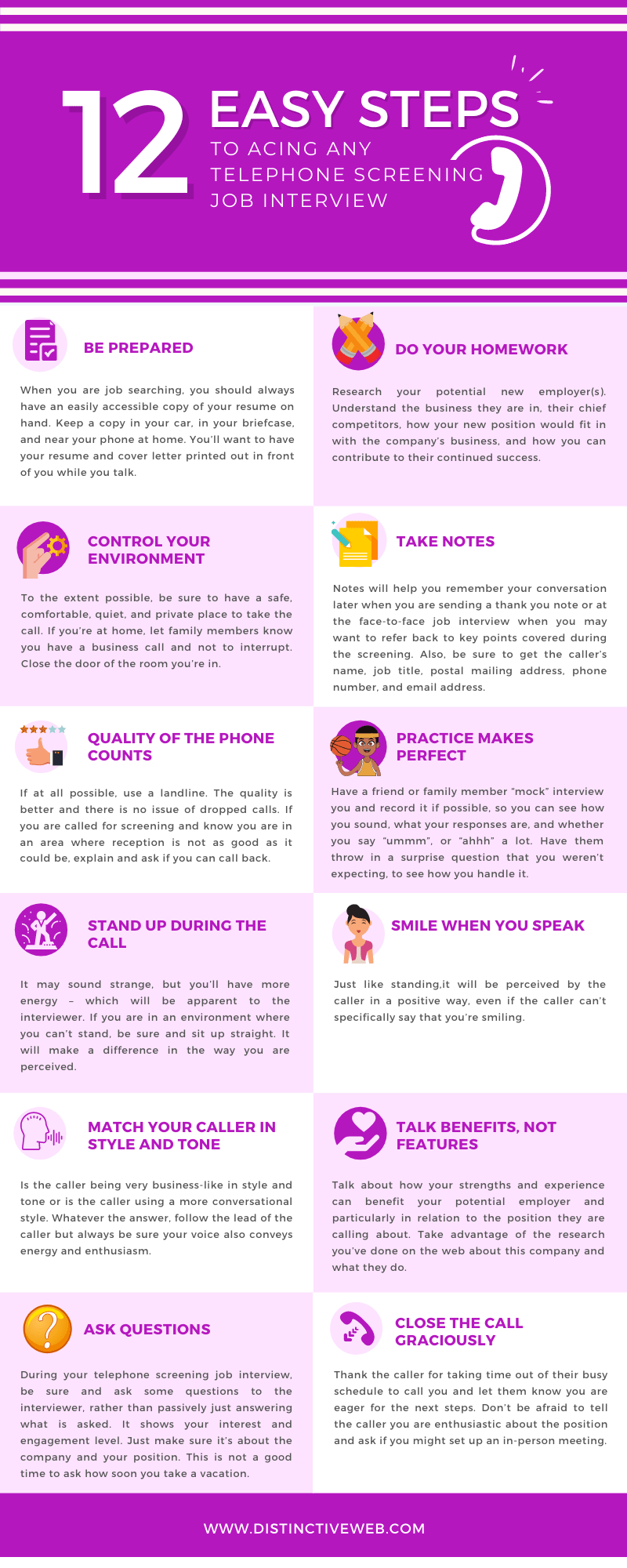
The first hurdle to overcome in getting that new job is often a telephone screening job interview. Recruiters and HR people use it as an initial device to pare down a list of job applicants.
Their intended outcome is to find reasons to cut you from the list of applicants that will be invited for a face-to-face job interview.
Your intended outcome should be to remain on the list and obtain a real face-to-face job interview. With that goal in mind, here are some tips to ace that preliminary phone screening.
Be prepared.
When you are job searching, you should always have an easily accessible copy of your resume on hand. Keep a copy in your car, in your briefcase, and near your phone at home. You’ll want to have your resume and cover letter printed out in front of you while you talk.
Also have a cheat sheet of bullet points you want to cover – your best accomplishments and specific strengths that would be valuable to your next employer. Prepare a cheat sheet of “success stories” that reference some of the key challenges and problems you have faced in your career, the actions you took to meet those challenges or solve those problems, and the specific results of those actions. You can use these stories to answer many questions.
Have a glass of water available.
Do your homework.
Research your potential new employer(s). Understand the business they are in, their chief competitors, how your new position would fit in with the company’s business, and how you can contribute to their continued success. Create a briefing sheet on each company you have applied to and keep copies of these ready to be accessed during telephone screening job interviews.
Control your environment.
To the extent possible, be sure to have a safe, comfortable, quiet, and private place to take the call. If you’re at home, let family members know you have a business call and not to interrupt. Close the door of the room you’re in.
If you have been caught off guard by the call it is okay to buy yourself some time by asking the caller if you may put them on hold for a few minutes, if you might call them back in five minutes, or if there is a convenient time for you to call back later that day.
If you currently employed, controlling the environment might be more difficult. Don’t worry – being employed is a good thing – and don’t be afraid to tell the interviewer that you need to schedule a mutually acceptable time so that you can have an environment where you can speak freely. They’ll understand.
Take notes.
Notes will help you remember your conversation later when you are sending a thank you note or at the face-to-face job interview when you may want to refer back to key points covered during the screening. Also, be sure to get the caller’s name, job title, postal mailing address, phone number, and email address. These should be used to send a thank-you note and for any other follow up.
Quality of the phone counts.
If at all possible, use a landline. The quality is better and there is no issue of dropped calls. Of course, many of us no longer have a landline phone. In that case, if you are called for a screening and know you are in an area where reception is not as good as it could be, explain and ask if you can call back.
Practice makes perfect.
Just the way you would for any other important event, practice first. Have a friend or family member “mock” interview you and record it if possible, so you can see how you sound, what your responses are, and whether you say “ummm”, or “ahhh” a lot. Have them throw in a surprise question that you weren’t expecting, to see how you handle it.
Stand up during the call.
It may sound strange, but you’ll have more energy – which will be apparent to the interviewer. If you are in an environment where you can’t stand, be sure and sit up straight. It will make a difference in the way you are perceived.
Smile when you speak.
Just like standing,it will be perceived by the caller in a positive way, even if the caller can’t specifically say that you’re smiling.
Match your caller in style and tone.
Is the caller being very business-like in style and tone or is the caller using a more conversational style. Whatever the answer, follow the lead of the caller but always be sure your voice also conveys energy and enthusiasm.
Talk benefits, not features.
Just like any salesperson, you must address the “what’s in it for us” listening mode of the interviewer.
Instead of telling the interviewer how hard you work, tell them of a time when you accomplished a great deal in a short period.
Instead of telling them how good you are with people, tell them of the time you got the entire group to do something that was unlikely.
Talk about how your strengths and experience can benefit your potential employer and particularly in relation to the position they are calling about. Take advantage of the research you’ve done on the web about this company and what they do.
Ask questions.
During your telephone screening job interview, be sure and ask some questions to the interviewer, rather than passively just answering what is asked. It shows your interest and engagement level. Just make sure it’s about the company and your position. This is not a good time to ask how soon you take a vacation.
Close the call graciously.
Thank the caller for taking time out of their busy schedule to call you and let them know you are eager for the next steps. Don’t be afraid to tell the caller you are enthusiastic about the position and ask if you might set up an in-person meeting.
As soon as the call is over send an email thanking the caller for their time and reiterating your interest in the position, then you may even follow the email with a handwritten thank you note sent by postal mail.
Follow these tips and your likelihood of getting to that face-to-face job interview is greatly enhanced.
Good Luck!
Republished from an updated article originally published on this blog May 16, 2012










